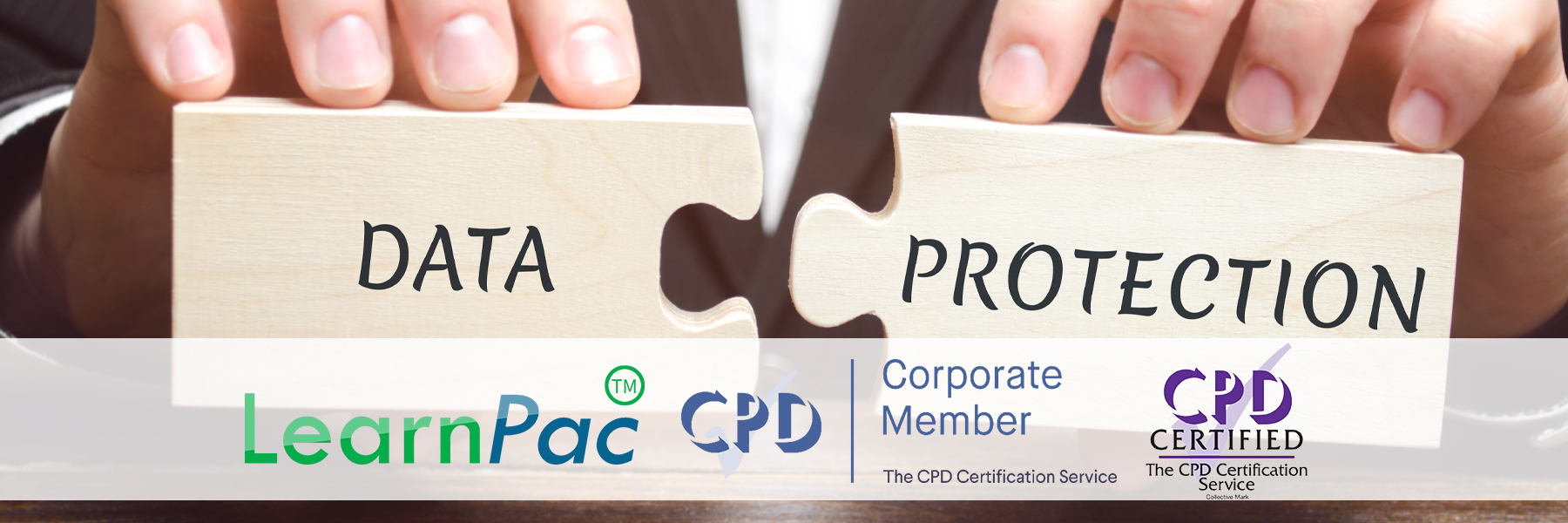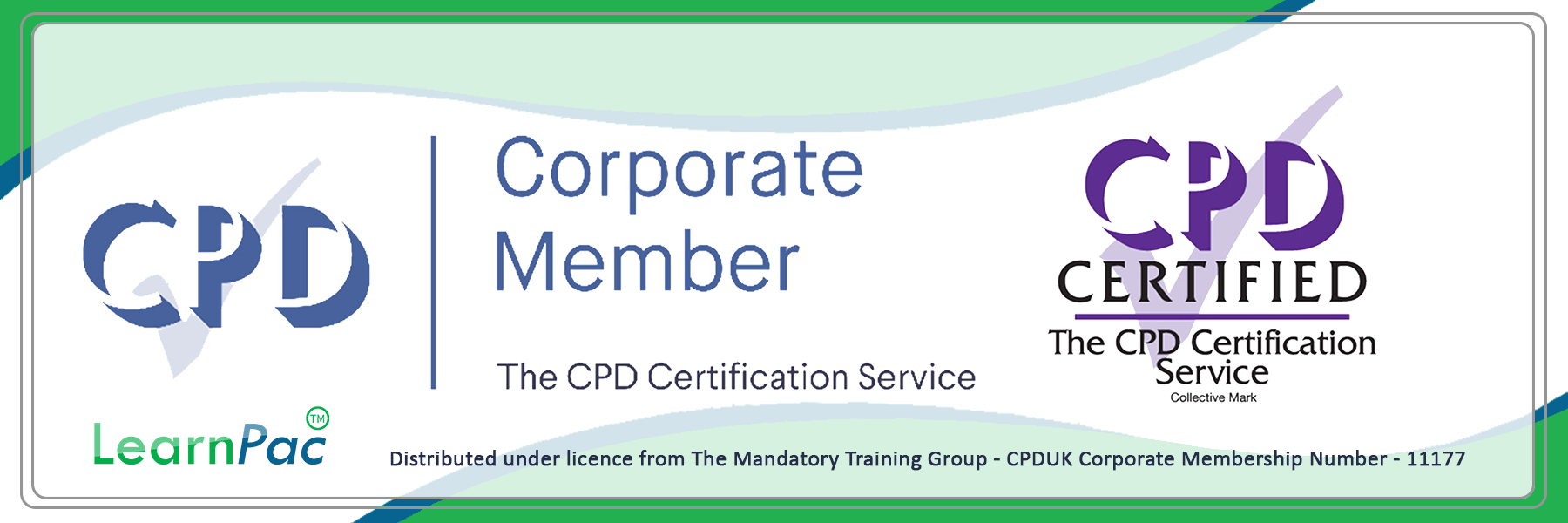Information Governance - E-Learning Courses - CPDUK Accredited

Information Governance – E-Learning Courses with Certificates – CPDUK Accredited.
LearnPac Systems is the leading UK provider of accredited statutory and mandatory training courses for all sectors, including health and social care, education, local government, private and charity sectors.
Information governance e-learning courses involves management of information and how to establish a framework for employees to handle data through robust policies and procedures.
Information governance is essential training for all staff. This course enables learners to gain an understanding of how to use principles and standards in their everyday work and provide staff with an introduction to information governance, including the principles of confidentiality, and data protection.
Browse our Information Governance - E-Learning Courses
Information Governance: Frequently Asked Questions and Answers
Information Governance – E-Learning Courses with Certificates – CPDUK Accredited – LearnPac Systems UK.
Here at LearnPac Systems, we receive many questions about information governance. We have provided answers to the most frequently asked questions about information governance.
Click on the text below to see the answers to the Frequently Ask Questions about Information Governance.
Information governance is a holistic approach to managing corporate information by implementing processes, roles, controls and metrics that treat data as a valuable business asset.
LearnPac Systems is the leading UK provider of accredited statutory and mandatory training courses for all sectors, including health and social care, education, local government, private and charity sectors.
Click here for Information Governance and Data Security – Online Course – CPD Accredited
Information governance helps manage and control information by supporting the organisation’s activities and ensuring compliance with its duties. Patients entrust their personal information to healthcare organisations, creating distinct requirements for confidentiality, privacy, and security.
LearnPac Systems is the leading UK provider of accredited statutory and mandatory training courses for all sectors, including health and social care, education, local government, private and charity sectors.
Click here for Care Certificate Standard 14 – Online Training Course – CPD Accredited
- Principle of transparency: Information governance will be conducted in an open, verifiable manner.
- Principle of integrity: Information management will maintain the reliability of the data.
- Principle of protection: All information will be kept secure.
LearnPac Systems is the leading UK provider of accredited statutory and mandatory training courses for all sectors, including health and social care, education, local government, private and charity sectors.
Click here for GDPR for Health and Social Care – Online Course – CPD Accredited
Information Governance describes the holistic approach to managing information by implementing processes, roles and metrics to transform information into a business asset. The purpose of the Information Governance framework is to establish an organisation’s approach to Information Governance formally.
The purpose of the assessment is to enable organisations to measure their compliance against the law and central guidance and to see whether the information is handled correctly and protected from unauthorised access, loss, damage and destruction.
A data governance framework refers to the process of building a model for managing enterprise data. The framework or system sets the guidelines and rules of engagement for business and management activities, especially those that deal with or result in the creation and manipulation of data.
Information Security Governance and Risk Management involved in the identification of an organisation’s information assets and the development, documentation, and implementation of policies, standards, procedures and guidelines that ensure confidentiality, integrity, and availability.
Information Governance is the management of information and how to establish a framework for employees to handle data through robust policies and procedures.
Data Governance is typically an IT owned responsibility and should account for all aspects of the data, both structured and unstructured, as it relates to information storage and movement.
Information Governance (IG) on the other hand, is typically a business or compliance/legal driven approach to managing and controlling how all enterprises used, retained and destroyed the content.
Data governance (DG) is the overall management of the availability, usability, integrity and security of data used in an enterprise. A sound data governance program includes a governing body or council, a defined set of procedures and a plan to execute those procedures.
It is essential to develop an IT security governance body that helps prioritise risks and build support for when more resources are required to protect the organisation.
Data Governance is required to ensure that an organisation’s information assets are formally, properly, proactively and efficiently managed throughout the enterprise to secure its trust & accountability. Adopting and implementing Data Governance can result in improved productivity and efficiency of an organisation.
Here is our list of key benefits:
1) Turn data into valuable business information.
2) Dramatically reduce the costs of discovery and litigation.
3) Improve compliance, minimise risk.
4) Increase business agility through improved decision making.
5) Increase profitability through shorten sales cycles.
Below are the steps in how to implement data governance:
Step 1: Prioritise areas for improvement
Step 2: Maximise information availability
Step 3: Create roles, responsibilities, and rules
Step 4: Ensure information integrity
Step 5: Establish an accountability infrastructure
Step 6: Convert to master data-based culture.
Sample data standards include naming standards, data modelling standards, and other data architecture standards. Data governance controls the procedures of addressing data related issues including data quality issues, data naming and business rules conflicts, data security issues, and service level problems.
An essential goal of information governance is to provide employees with data they can trust and easily access while making business decisions. In many organisations, responsibilities are split for data governance tasks are among security, storage and database teams.
Information Governance is taking hold in healthcare, and many organisations are making significant progress. Information Governance and leveraging the organisation’s information assets has extraordinary value. Examples include:
- Reduced costs associated with managing and finding information
- Avoidance of costly data breaches
- Enhanced analytics capabilities, including that necessary coordination of care and population health management
- Better integration of information and its management in mergers and acquisitions
- More effectively meeting compliance challenges
- Increased workforce awareness and adherence to information policies
- Alignment with and support of strategic goals and competitive advantage
Like other performance improvement initiatives, it is vitally essential for any organisation embarking on IG to define for itself the expected outcomes and plans and metrics for how it will achieve its goals. The IG program provides a framework for this.
Information is an essential resource in any business or organisation, without which operations and running the business is not possible. Accordingly, investments are made in people, process, and technology to assure that information can support the business or enterprise. Information governance provides a disciplined approach to managing the value and risks associated with information and its use.
Information governance in health care is defined as the structures, policies, and relevant procedures initiated and adhered to by hospitals, health care providers and medical insurance companies to collect, organise, utilise and secure data.
The main duties and responsibilities of an information governance officer are as follows:
- To assist compliance with the local freedom of information policy.
- To work with the Information Governance Officer and the Records and IG Manager.
- To process FOI requests and keep relevant FOI databases up to date.
- To provide a Trust Information Governance newsletter quarterly.
Information governance is about the way information is stored and shared. This information governance training will teach you about the importance of confidentiality and what personal data can and cannot be used for.
The Caldicott Principles are fundamentals that organisations should follow to protect any information that could identify a patient, such as their name and their records. They also ensure that this information is only used and shared when it is appropriate to do so.
- Justify the purpose for using confidential information.
- Don’t use personal confidential data unless necessary.
- Use the minimum necessary personal confidential data.
- Access to personal confidential data should be on a strictly need-to-know basis.
- Everyone with access to personal confidential data should be aware of their responsibilities.
- Understand and comply with the law.
- The duty to share information can be as essential as the duty to protect patient confidentiality.
The four main NHS code of confidentiality are:
- PROTECT
- INFORM
- PROVIDE CHOICE
- IMPROVE.
Information governance is essential training for all staff. This course enables learners to gain an understanding of how to use principles and standards in their everyday work. This session aims to provide healthcare staff with an introduction to information governance, including the principles of confidentiality, data protection, subject access requests and freedom of information requests.
This online information governance training course is aimed at all staff throughout the NHS and private healthcare and social care sectors, including:
- All new employees, whether clinical nor non-clinical
- Existing staff completing mandatory refresher training
- Locum doctors and healthcare professionals
- Agency nurses and healthcare assistants (HCAs)
- NHS professionals temporary or bank staff)
- Unpaid and voluntary staff.
Information governance is about the way information is stored and shared. This information governance training will teach you about the importance of confidentiality and what personal data can and cannot be used for.
Protecting people’s information has never been more important. This interactive e-learning has been developed by industry professionals, to safeguard you against data breaches and unlawful practice.
The course covers various important areas of guidance and legislation, with practical steps to meet legal requirements and protect the data of people in your care. You will learn about the safe use and management of IT equipment, storage and use of personal information, and how and why to adopt appropriate security measures.
LearnPac Systems is the leading UK provider of accredited statutory and mandatory training courses for all sectors, including health and social care, education, local government, private and charity sectors.
Click here for more Information Governance E-Learning Courses
On successful completion of each of the information governance courses modules, you will be able to download, save and/or print a quality assured continuing professional development (CPD) certificate. Our CPD certificates are recognised internationally and can be used to provide evidence for compliance and audit.
The CPD Certification Service (CPDUK) accredits all of our statutory and mandatory training courses as conforming to universally accepted Continuous Professional Development (CPD) guidelines.
LearnPac Systems is distributed under the licence from The Mandatory Training Group – CPDUK Corporate Memebrship Number – 1117.





